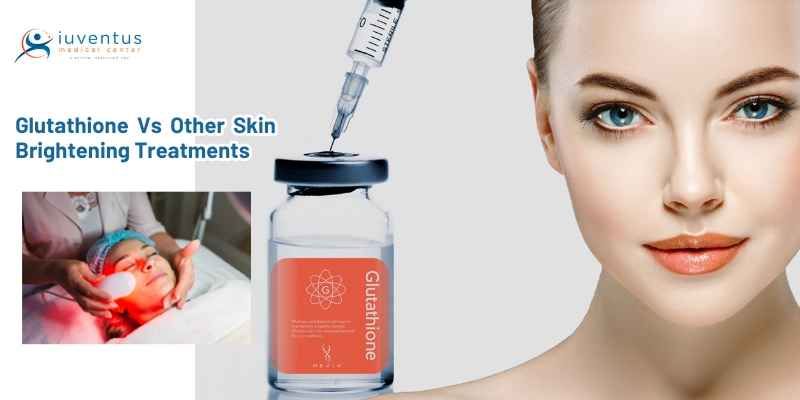Glutathione Vs Other Skin Brightening Treatments: Which is the Best?

Glutathione vs. Other Skin Brightening Treatments: Which Is Best?
Everyone wants that radiant, “lit-from-within” glow. If uneven skin tone or dark spots are affecting your confidence, you’ve likely come across Glutathione. But how does this powerhouse antioxidant stack up against other popular treatments?
From professional injectables to daily serums, here is everything you need to know to choose the right brightening path for your skin.
What is Glutathione?
Naturally produced by your cells, Glutathione is often called the “master antioxidant.” It supports your immune system, repairs tissue, and neutralizes free radicals.
As we age, our natural levels of Glutathione decline, which can accelerate the signs of aging. By boosting these levels through targeted injections, you can help restore a youthful, supple appearance. In dermatology, it is highly prized for its ability to brighten skin from the inside out.
How Glutathione Injections Work
Unlike topical creams that sit on the surface, Glutathione injections deliver the antioxidant directly into your system.
-
The Process: A specialist creates a custom mixture tailored to your skin type and goals.
-
The Schedule: Usually, you’ll start with three sessions per week during the “loading phase,” eventually moving to once-a-week maintenance.
-
The Results: Most patients begin to see a visible difference within 6 to 8 weeks.
Understanding Skin Brightening
Skin brightening isn’t just about changing your color; it’s about restoring balance. Treatments target melanin production to fix issues caused by sun exposure, hormonal shifts (like melasma), and aging.
Common ingredients and methods include:
-
Vitamin C: Limits melanin production while boosting collagen for a healthy glow.
-
Kojic Acid: A natural derivative of fungi that effectively fades dark spots.
-
Hydroquinone: A potent agent that stops the enzyme responsible for pigment, though it can sometimes irritate.
Popular Treatment Alternatives
If injections aren’t your first choice, there are several other effective clinical options:
-
Chemical Peels: These use specialized acids to exfoliate the top layer of skin, revealing a brighter, more even-toned layer underneath.
-
HydraFacial: A three-in-one treatment that cleanses, extracts, and hydrates. It uses a “vortex” technology to infuse the skin with brightening serums.
-
Laser Skin Lightening: These use targeted light energy to break down pigment clusters deep in the skin.
-
Microdermabrasion: A non-invasive “polishing” of the skin that stimulates collagen and buffs away dullness.
Comparison: Glutathione vs. The Rest
| Feature | Glutathione Injections | Other Brightening Treatments |
| Method | Systematic (Internal) | Topical or Surface-level |
| Main Benefit | Detoxifies & slows melanin | Targets specific spots & texture |
| Application | Vaccine-style shots | Creams, peels, or lasers |
| Focus | Overall skin health & glow | Addressing damage/hyperpigmentation |
Comparing Glutathione Vs Other Skin Brightening Treatments
Consider the following when comparing glutathione to other skin brightening treatments;
-
Glutathione works by slowing down melanin production and decreasing oxidative stress
-
A dermatologist administers glutathione injection as vaccine shots, and other skin brightening treatments through topical creams, serums, and oral supplements
-
Glutathione has antioxidant properties that enable overall skin health
-
Skin brightening treatments work by stimulating the skin. It prevents tyrosinase activity and boosts brightening.
-
Some skin brightening treatments can have potential side effects and varying levels of effectiveness.
Which Treatment Is Right for You?
The best choice depends on your specific skin concerns:
-
Choose Glutathione if you want a systemic “glow-up” that improves overall skin health and reduces oxidative stress.
-
Choose Peels, Lasers, or Facials if you want to target specific texture issues, deep wrinkles, or stubborn sun damage.
Conclusion
Whether you choose the internal power of Glutathione or the resurfacing benefits of a HydraFacial, radiant skin is within reach. Consult with a specialist to determine which method aligns best with your skin tone and lifestyle.
